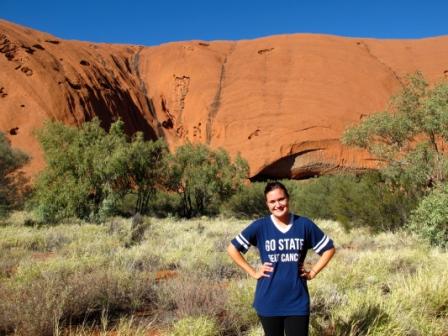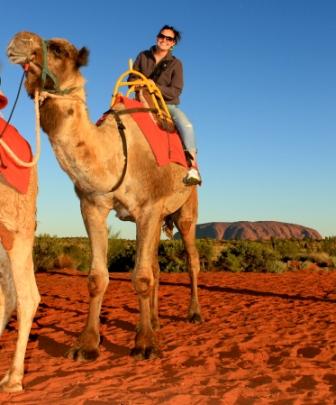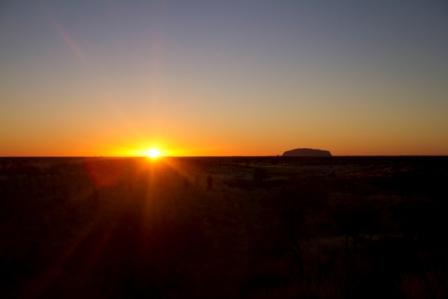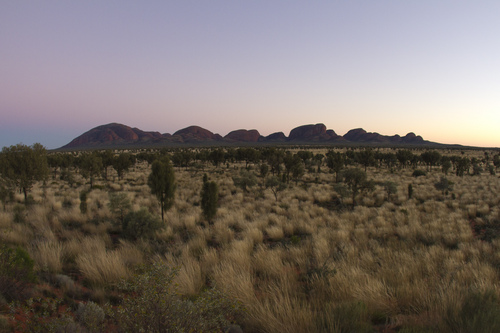Everyone’s seen a picture of Uluru. The big red rock in the Australian Outback is one of the most recognized natural landmarks in the world. It’s a popular destination for people visiting Australia, but many students studying abroad don’t make the trip because it’s not very cost effective staring at a big rock isn’t the #1 thing on many college students agendas. I have no idea if I’ll ever return to Australia, so I figured why not make a trip out to Uluru to see what all the hype is about. Just like the trip to Cairns, I’d have a lot of recommendations for someone making this same trip, but this trip was incredible and a must do for anyone who appreciates nature. At the University of Wollongong I am taking two classes in Indigenous Studies so my new found appreciation for the Aboriginal culture also influenced my decision to make the trip.
 To clarify, Uluru is the traditional Ananju name for the rock. It is located in Uluru and Kata Tjuta National Park. Kata Tjuta is a second rock formation with religious significance to the Ananju people and mostly closed off from visitors. Ayers Rocks is the name given to Uluru by the first whitemen to travel through the area. The tourist area outside of Uluru and Kata Tjuta National Park is known as Ayers Rock Resort. We flew into Ayers Rock Airport and stayed at the Outback Pioneer Lodge (a YHA hostel), but many people make the trip to the national park from Alice Springs. There are many overnight tour options that leave from Alice Springs to see Uluru, but the cost of flying from Syndey to Alice Springs was twice that of the cost to fly into Ayers Rock Resort.
To clarify, Uluru is the traditional Ananju name for the rock. It is located in Uluru and Kata Tjuta National Park. Kata Tjuta is a second rock formation with religious significance to the Ananju people and mostly closed off from visitors. Ayers Rocks is the name given to Uluru by the first whitemen to travel through the area. The tourist area outside of Uluru and Kata Tjuta National Park is known as Ayers Rock Resort. We flew into Ayers Rock Airport and stayed at the Outback Pioneer Lodge (a YHA hostel), but many people make the trip to the national park from Alice Springs. There are many overnight tour options that leave from Alice Springs to see Uluru, but the cost of flying from Syndey to Alice Springs was twice that of the cost to fly into Ayers Rock Resort.
On our first night in the area, we took a sunset camel tour. This is one of my top two Australian experiences (the other being holding a koala) and no trip to Uluru should be without a camel ride. After being picked up at our hostel, we were taken to the camel farm and given a briefing about how to ride. I was riding Hercules, the largest camel at the farm (did they really think I needed the biggest camel?). There were about 15 other camels in the caravan and for the ride, the camels were all attached to each other at the nose. A little strange, but this has been the way camel caravans have worked for centuries. As we trotted through the outback, the tour guides gave us some information about camels and the area. After about 45 minutes of walking, we stopped to watch the colors change over Uluru as the sun set in the distance. This was not as stunningly beautiful as some postcards may make it out to seem, but who cares because I got to watch the sunset while riding a camel! To top off a great night, we were treated to homemade bread and sparkling Australian wine after our hour ride.
 The next day we woke up early (5am) and took the Uluru Express to Uluru. This shuttle bus is $60 and the cheapest way to get from Ayers Rock Resort to Uluru. After watching the sunrise from a viewing area with a million other tour groups and attempting not to freeze, we were dropped off right next to Uluru. We joined the 8am guided ranger walk which took us along the Mala Walk. The ranger told us the Anangu traditions of the area (though she was not an Aboriginal person herself) and pointed out some of the significant sights along the trail. After this hour walk, we continued our way around Uluru along the Base Walk. This 10km walk takes 3-4 hours but is the best way to see Uluru. Each step you take gives you a different perspective of Uluru. It seemed that from every angle you were looking at a different rock! I have never been so in awe of a natural structure. Let me tell you, Uluru cannot be done justice by a simple picture!! After our walk, we went to the Cultural Center to view some Aboriginal artwork and learn a little more information about the park. Surprisingly, there are very few Aboriginal Australians who work in the park and nearly zero who work in the Ayers Rock Resort. This is an example of the continued power struggle between Aboriginal Australians and the Australian government.
The next day we woke up early (5am) and took the Uluru Express to Uluru. This shuttle bus is $60 and the cheapest way to get from Ayers Rock Resort to Uluru. After watching the sunrise from a viewing area with a million other tour groups and attempting not to freeze, we were dropped off right next to Uluru. We joined the 8am guided ranger walk which took us along the Mala Walk. The ranger told us the Anangu traditions of the area (though she was not an Aboriginal person herself) and pointed out some of the significant sights along the trail. After this hour walk, we continued our way around Uluru along the Base Walk. This 10km walk takes 3-4 hours but is the best way to see Uluru. Each step you take gives you a different perspective of Uluru. It seemed that from every angle you were looking at a different rock! I have never been so in awe of a natural structure. Let me tell you, Uluru cannot be done justice by a simple picture!! After our walk, we went to the Cultural Center to view some Aboriginal artwork and learn a little more information about the park. Surprisingly, there are very few Aboriginal Australians who work in the park and nearly zero who work in the Ayers Rock Resort. This is an example of the continued power struggle between Aboriginal Australians and the Australian government.
 On day 3 we took a tour of Kata Tjuta with the SEIT Outback tour company. You can visit Kata Tjuta with the Uluru Express (about $80 for a shuttle), though we chose to do a tour for a little more money in hopes that it would be educational – and it was! We learned about the formation of Uluru and Kata Tjuta, why they are red (they’re made of iron), and what it’s like to live in Ayers Rock Resort with only 800 other people (a little boring). Our tour took us through the Wapa Gorge after we saw the most incredible sunrise over Uluru. While I was not near as impressed with Kata Tjuta as I was with Uluru, the sunrise was the 2nd best highlight of the trip (not much can top a camel ride). We flew out of Ayers Rock Airport the next day after lounging by the pool all morning.
On day 3 we took a tour of Kata Tjuta with the SEIT Outback tour company. You can visit Kata Tjuta with the Uluru Express (about $80 for a shuttle), though we chose to do a tour for a little more money in hopes that it would be educational – and it was! We learned about the formation of Uluru and Kata Tjuta, why they are red (they’re made of iron), and what it’s like to live in Ayers Rock Resort with only 800 other people (a little boring). Our tour took us through the Wapa Gorge after we saw the most incredible sunrise over Uluru. While I was not near as impressed with Kata Tjuta as I was with Uluru, the sunrise was the 2nd best highlight of the trip (not much can top a camel ride). We flew out of Ayers Rock Airport the next day after lounging by the pool all morning.
- Do not climb Uluru – it’s dangerous (people fall off the rock and die), disrespectful to the local Aboriginal people, and harmful to the environment (your presence pollutes the water at the top of Uluru and you are causing physical damage to the rock).
- Do a sunset camel ride. You HAVE to. The farm also offers 15 minute rides around the farm or a sunrise ride, but I’d recommend the sunset one as it’s warmer than sunrise and would give you a longer ride during while the sun is out.
- Stay two nights. We stayed three and this was too long. You could do the camel tour in the same day as Uluru or Kata Tjuta.
- Wake up early. Even though it was freezing in the mornings as we watched the sunrise, the sunrises were beautiful and you’ll be happy you’re not out walking in the peak heat of the day.
- Do the Valley of the Winds walk at Kata Tjuta. We did not do this because we didn’t want two long walks in two days, but I regret not seeing this part of Kata Tjuta as some people consider it more incredible than Uluru.
- Go to the Cultural Center near Uluru and learn something!
- Research/book your tours before you go.
- Uluru is located in the desert which means it can get very cold in the autumn/winter. In April, the temperatures in the morning were 40 degrees. I wish I’d had gloves and a hat. I wore three t-shirts, a jacket, scarf, and leggings and even I was still cold. You can take off layers as you walk, but until the sun is fully up around 11, it’s chilly!!!!
Location: Ayers Rock, Australia


